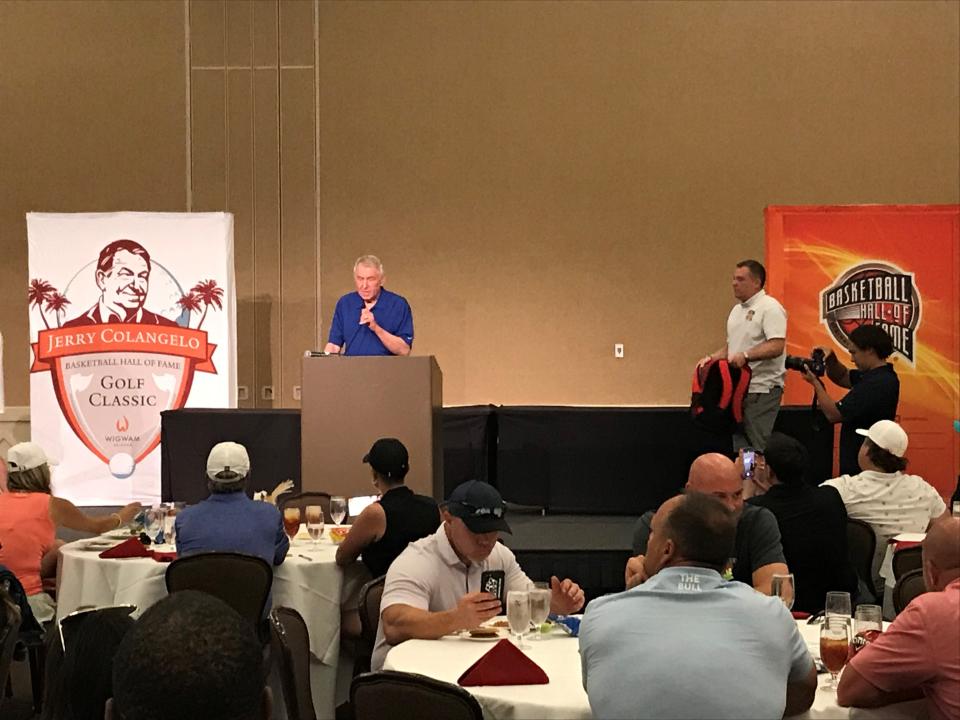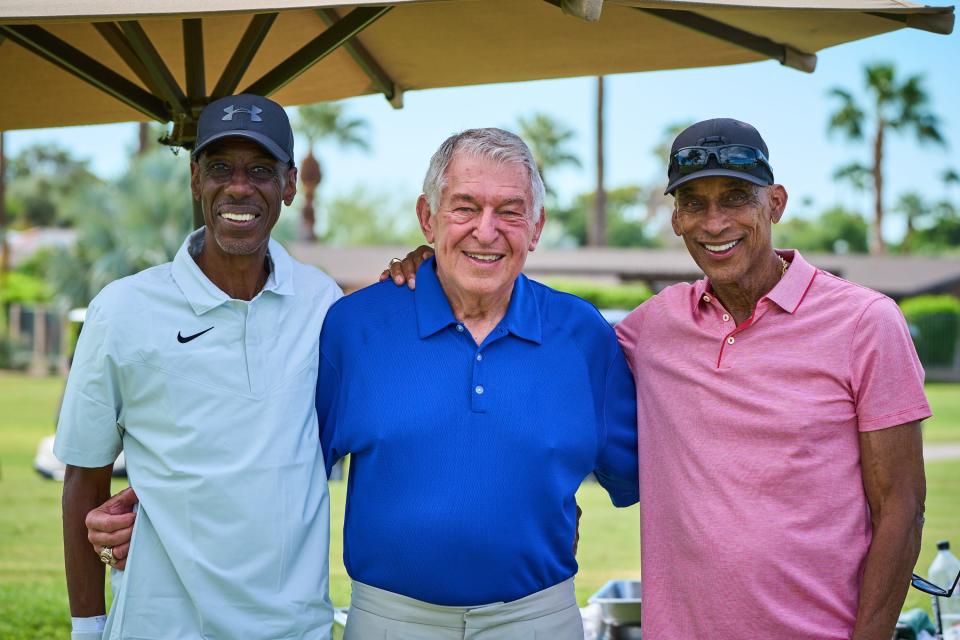NBA legends share vintage Suns stories at Jerry Colangelo's Hall of Fame Golf Classic
Family reunions are all about sharing hilarious and sobering stories about how the past shapes the future.
Former Phoenix Suns owner Jerry Colangelo's 11th annual Basketball Hall of Fame Golf Classic at Wigwam Golf Resort in Litchfield Park on Friday was more than just a charity tournament.
It was a tremendous lesson from nearly 30 players among the NBA's pantheon dating back to the 1960s discussing anecdotes with each other, their golf teammates for the event, and media members about the league before it became the global conglomerate it is today.
Hearing these Hall of Famers tell stories about their personal lives, careers, and the Suns during the event was like watching an NBA documentary film live on the green.

“When I tell you it’s the best experience, it’s like a family reunion because I get to talk to players that played against, some older than others, and we just exchange stories, laugh and just reminisce about the good times," former Suns center Steven Hunter said about being at the event for his third time.
Younger retired players such as Arizona Wildcats legend and former NBA guard Mike Bibby admitted he still becomes somewhat star struck playing golf with his predecessors such as Gary Payton, whose team won the event as they shot -55.
“Some of these guys I never got to meet, maybe see them in passing, but you’re in awe still," Bibby said. "You see Gary Payton out here, Rick Barry, all the way down the line. It’s just good to be around this.”
Gary Payton’s team finished
in first place (-55) among the 18 teams in the 11th annual Jerry Colangelo @Hoophall Golf Classic. pic.twitter.com/Ix1m2vzZpc— DANA (@iam_DanaScott) October 7, 2022
Chris Mullin dished on his playoff battles between his Golden State Warriors and Suns, in the early 1990s, how the Cotton Fitzsimmons-coached Suns teams were influential to today's popular small-ball offense, and Colangelo picking him for the 1992 Olympics' USA Dream Team was Mullin's "biggest achievement."
Los Angeles Lakers great Jamaal Wilkes recalled the Suns as one of their best rivals along with the Boston Celtics.
“We used to have some classic battles with (former Suns) Alvan Adams, Walter Davis, Alvin Scott, Paul Westphal and all these guys, great players," Wilkes said. "We won a lot, but we took them very serious. We saw them as rivals for the West championship.”
One of this year's Hall of Fame inductees, George Karl, compared what happened to his 1994 Seattle Supersonics to the fate suffered last year by the Suns. Seattle lost a first-round Game 7 at home as the No. 1 overall playoff seed to the eighth-seeded Denver Nuggets; the top-seeded Suns were blown out at home by Dallas in the West semifinals Game 7.
“There are very few teams that can win in the playoffs without failure,” the former coach said. “They gotta go through pain. They gotta go through a bad loss or a bad performance, and I think that’s where you grow up, mature a little bit. Very few teams can ever just go and win a championship. They gotta go get smacked in the face, pick themselves back up and come again.”
Scott: Colangelo is 'the NBA's diamond'
As this basketball fraternity's patriarch for over 50 years, Colangelo is the common denominator for many of these basketball legends.
Compared to the Golf Classic's participants wearing shorts and golf apparel, Colangelo, the Hall of Fame chairman, stood on the green looking like basketball's version of The Godfather, with his black and gold-trimmed Gucci sunglasses, a blue polo shirt, pleated grey slacks and black penny loafers.
Spencer Haywood said Colangelo was one of the few advocates among NBA brass who helped him enable high school players forego their college eligibility to turn pro.
Haywood helped pioneer the "hardship" rule for amateur players when he declared for the NBA draft at the end of the 1968-69 season, when he was a dominant college sophomore for the University of Detroit.
The NBA's rule at the time said a player could not be drafted by an NBA team until four years after graduating from high school. Haywood filed an antitrust lawsuit that made its way to the U.S. Supreme Court. Meanwhile, he was able to join the Denver Rockets of the rival American Basketball Association after that league created its own hardship rule.
The court allowed Haywood to join the Seattle Supersonics for the 1970-71 season while the case was in litigation. Eventually, the Supreme Court upheld an injunction against the NBA issued by a U.S. District Court in California, paving the way for changes in the NBA's eligibility rules.
Spencer Haywood spoke to me durin @Hoophall Golf Classic about how ex-Suns owner Jerry Colangelo was one of the few who advocated for him in the late 1960s Supreme Court case for Haywood to play professionally out of high school, paving the way for HS stars to play in the NBA. pic.twitter.com/BWxiT9CWvr
— DANA (@iam_DanaScott) October 7, 2022
Other great Colangelo-related stories came from his former college basketball teammate at Illinois, Mannie Jackson. He said Colangelo was one of the league's earliest supporters of him pushing for a Black-owned NBA group to buy the San Diego Clippers in the early 1980s. That was long before Colangelo was instrumental helping former BET channel founder Bob Johnson become the league's first majority Black owner, buying the Charlotte Hornets in 2002.
Jackson, former Harlem Globetrotters owner, also mentioned that Colangelo was the key in helping him move the world-famous exhibition team's headquarters in New York to Arizona after he bought the Globetrotters in 1993.
One of the most intriguing storytellers at the event regarding the Suns' early days with Colangelo was former All-Star Charlie Scott.
In addition to his 1960s New York City high school basketball stories playing against fellow Harlem native Kareem Abdul-Jabbar and late Suns great Connie Hawkins, Scott credited Colangelo for why he's a Hall of Famer.
“Jerry Colangelo is the best thing that ever happened to basketball,” Scott said. “I think if you ask anyone he’s involved with, they’ll say that he’s the diamond of the NBA."
He added, while laughing along side Colangelo, "I’m proud to say that I was his daughter’s favorite player for all those years that he was cursing me out.”
Scott attributed the mercurial personality Colangelo and the Suns dealt with stemmed from racial strife Scott faced as the first African-American to play for North Carolina on on scholarship. That was in 1967, when that state was a Ku Klux Klan stronghold during the Jim Crow segregation laws of the South.
“Going to North Carolina, there were certain things I knew I couldn’t do, and certain promises that I had to make to the coaches that I would hold my temper,” Scott said. “And what happened after that, I went in a reverse angle after that. I became a very emotional person from things I held in for a long time and let out.”

Scott was signed by the Suns in 1972 after he played the previous three years for the Virginia Squires in the ABA. He played 10 years in the NBA until he retired in 1980.
“It was competitive. They were going after our players,” Colangelo said about the ABA. “When we signed Charlie Scott, I get a call from friend of mine who worked for American Airlines in Chicago at O’Hare (Airport). He said, ‘Jerry, there’s a group of people here who are coming to Phoenix trying to sign some of your players from the ABA.’ And so before they got off the plane in Phoenix, we served them (lawsuits). ...
"They had to get back on the plane and get the hell out."
Scott remained with the Suns for the next three years before he was traded to Boston for Paul Westphal in 1975.
"Trades should be good for both teams," Colangelo said. "We trade him to Boston for Paul Westphal. Westphal comes to us, the next five years he’s like first-team, second-team All-NBA. Every one of those years led us to some really great things. And Charlie went to really great team and was part of a championship team, so it really worked out for both.”
That Celtics championship team, of course, was the one the Suns faced in the 1976 NBA Finals. In Game 5, considered by many as the greatest ever played, Suns forward Gar Heard’s famous "Shot Heard Around The World" forced triple overtime. Boston won that game at home, then earned the title in Game 6.
Have tips for us? Reach the reporter at dana.scott@azcentral.com or at 480-486-4721. Follow his Twitter @iam_DanaScott.
Support local journalism. Start your online subscription today.
This article originally appeared on Arizona Republic: NBA legends share Suns stories at Colangelo's Hall of Fame golf event

